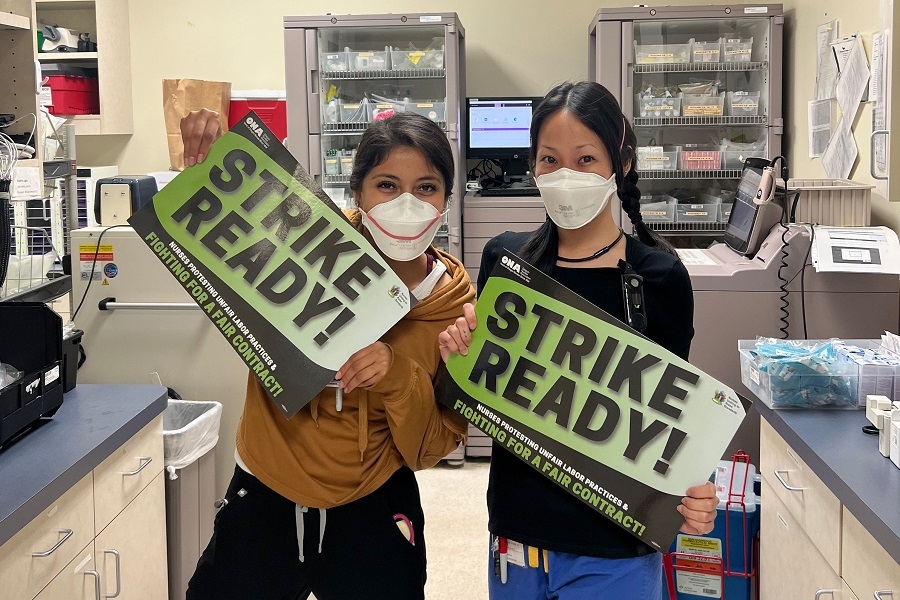Union says the strike is a response to ‘illegal unfair labor practices’; Providence calls the strike vote ‘premature’
Nurses at Providence Milwaukie Hospital and Willamette Falls Medical Center in Oregon City have voted to authorize a strike against the health care provider.
In a vote the Oregon Nurses Association described as “nearly unanimous,” nurses at Providence Willamette Falls Providence Milwaukie voted to authorize a strike.
They follow the lead of more than 1,600 nurses at Providence St. Vincent who voted to authorize a strike against Providence in May.
The vote means the union can now call a strike affecting all three facilities if they deem necessary during contract negotiations.
According to a press release by the ONA, the strike was authorized to “protest Providence’s illegal unfair labor practices and demand fair contracts which improve patient care, raise nurse staffing standards, make health care more affordable and address Providence’s growing staffing crisis.”
Contracts at the St. Vincent and Willamette Falls hospitals expired last year, and the contract at Milwaukie expired in May.
“Management is aware we’re struggling, that patients are getting a little sicker, nurses are getting a lot newer, and turnover is higher. But the things we’ve been asking for aren’t really being addressed or taken seriously,” Rae Cunningham, a nurse at Providence Milwaukie, tells Oregon Business.
Cunningham says health care workers are abandoning the profession due to a combination of high patient volume and insufficient pay, leaving new and remaining nurses with longer shifts and without sufficient support.
She is hopeful that a wage increase will help retain experienced nurses and attract more new nurses. She also hopes her new contract will bring Providence on par with other hospitals in the area, and that staffing shortages have led to a patient-to-nurse ratio which has impacted quality of care.
According to Cunningham, new COVID-19 cases, an aging baby boomer population and people who have delayed health care visits during the pandemic have led to a consistent high volume of patients, and regular 12-hour shifts.
Rebecca Sudduth, an emergency room nurse at Providence St. Vincent, says the successful strike authorization against Kaiser Permanente in November 2021 helped inspire her and her fellow nurses to take action.
“I actually have a neighbor who works for Kaiser. It was pretty amazing to watch that,” says Sudduth. “I remember before they were about to go on strike, asking them, ‘What’s it like?’ and ‘Why are you doing it?’ Now I’m asking them, ‘How does the first day work? Do you call in sick?’”
Kaiser narrowly averted the strike by agreeing to increase wages and suspend a proposed two-tiered wage system which the Oregon Federation of Nursing and Health Professionals Local 5017 claimed would discourage new nurses from applying.
In the long term, Sudduth wants legislation to mandate safe nurse-to-patient ratios. For now, she wants what she describes as “basic safe staffing language” written into the new contract.
“We want the language in the contract to take into consideration the sickness level of a patient within an assignment and use that as a stepping point to determine ratios,” she says.
Graham Trainor, president of the Oregon AFL-CIO, says the strike vote shows health care workers across the state are at a breaking point.
“The pandemic has put such an enormous strain on our healthcare system and the people we rely on to treat patients and take care of those in their darkest hour keep saying, ‘Enough is enough.’ That’s why we saw incredible support for Kaiser workers when they voted to go on strike — and why we’re seeing that same level of support for Providence nurses,” says Trainor.
In a statement submitted to Oregon Friday morning, a spokesperson for Providence Health & Services called the strike authorization vote “premature” but added that the hospital system is “eager to continue dialogue with ONA as we work to find mutually agreeable solutions.”
“Since contracts are settled at the bargaining table, we encourage the union to avoid a costly strike for our nurses,” the statement added.
Providence’s statement also said the provider is committed to providing care regardless of whether a strike is called.
“We have a comprehensive plan that ensures the delivery of that care to the communities who rely on us, even if nurses choose to walk out. Our hope is that everyone will continue to bargain in good faith,” the statement added.
If a strike is called, organizers will provide Providence with a 10-day notice to give adequate time to cease admissions and transfer patients, or reach an agreement to avoid a work stoppage.
To subscribe to Oregon Business, click here.










